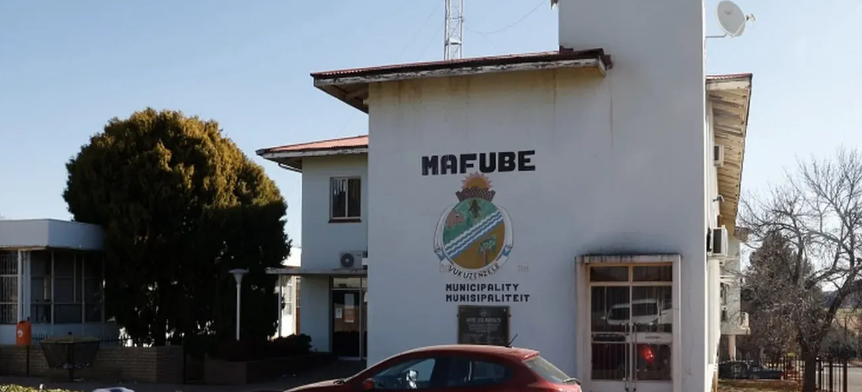By Johnathan Paoli
The governance crisis in the ANC-led Mafube Local Municipality has reached breaking point, with residents preparing to take legal action against the Free State-based council.
Residents have accused the municipality of failing to enforce or maintain functional bylaws, a lapse that has crippled service delivery, left law enforcement powerless, and increased community anger.
The escalation follows yet another delay in the payment of staff salaries.
Mafube has been under Section 139 administration since 2022, and residents have said they fear total administrative collapse.
Democratic Alliance councillor Suzette Steyn said that the party will now escalate the crisis to the province’s Cooperative Governance and Traditional Affairs (Cogta) department for urgent intervention.
“Without clear communication or a legal framework to enforce rules, confusion arises among residents and law enforcement, often leading to inaction and conflict. The absence of dispute resolution mechanisms leaves municipalities exposed to legal challenges from residents affected by the lack of regulation,” Steyn said.
Residents from Frankfort, Tweeling, Villiers, and Cornelia are preparing to approach the courts, citing violations of the Municipal Systems Act, which compels municipalities to pass bylaws regulating local affairs and protecting community rights.
Mafube currently has only one gazetted bylaw, its Municipal Land Use Planning Bylaw, published in 2017.
The absence of others has resulted in a near-total breakdown of order: cattle roam freely through town streets, noise complaints go unresolved, property valuations are disputed and illegal land occupations persist unchecked.
The lack of enforceable local laws has also made waste collection, infrastructure maintenance and zoning compliance nearly impossible, further undermining public safety, business investment and property values.
“The community has no recourse. Without bylaws, there are no rules, no penalties, and no consistent governance,” said Steyn, adding that the municipality’s failure to legislate basic community regulations has left residents vulnerable to “administrative chaos and corruption”.
The governance crisis comes amid a deepening financial meltdown.
Acting municipal manager Jamela Selapyane confirmed in a memorandum to staff that the municipality was unable to pay October salaries due to depleted funds.
“Management acknowledges the inconvenience this situation may cause and assures employees that every effort is being made to resolve the financial issues,” Selapyane wrote, pledging to communicate a payment date once confirmed.
Mafube has repeatedly missed salary deadlines over the past decade and has failed to honour pension deductions, resulting in a string of court cases.
In January, the Free State High Court delivered a landmark ruling, holding Mayor Tlhoare Motsoeneng, the municipal manager, and the chief financial officer personally liable for R14.7 million in unpaid pension contributions owed to workers.
In his ruling, Judge Johann Opperman described the municipality’s conduct as questionable, noting that officials “would rather challenge every legal application than pay employees’ money to the Fund”.
The court ordered the officials to repay the full amount with interest and referred the case for possible criminal investigation.
Despite this, Mafube’s leadership has continued to face allegations of mismanagement and non-compliance.
The ANC’s Free State Provincial Working Committee suspended Mayor Motsoeneng earlier this year over the scandal, but little has changed in practical terms.
The municipality’s financial collapse is further compounded by its inability to collect revenue.
The Select Committee on Cooperative Governance and Public Administration found that Mafube collects only 20% of service charges, leaving R1.5 billion in unpaid debt from government departments and ratepayers.
Chairperson Mxolisi Kaunda said the committee remained deeply concerned that financial recovery plans cannot succeed without a solid revenue base, warning that the municipality’s cash flow was unsustainable.
Kaunda condemned the failure of national and provincial departments to pay their own municipal bills, describing it as unacceptable that government departments contribute to the cash-flow crisis.
The committee also found that Mafube owes approximately R200 million to the South African Local Authorities Pension Fund and the Municipal Workers Retirement Fund, jeopardising employees’ future access to retirement benefits.
During a recent oversight visit, the committee found the Frankfort Waste Water Treatment Plant in the municipality was operating below capacity, with significant water losses and poorly maintained infrastructure.
Disagreements between the municipality and service providers over project payments have delayed critical upgrades meant to address water shortages in the area.
Basic services like waste removal, street lighting, and road repairs have deteriorated sharply, while business confidence has plummeted.
The DA said it would formally request that Cogta and the National Council of Provinces intervene to stabilise Mafube’s finances, enforce the adoption of key bylaws, and hold delinquent officials accountable.
INSIDE METROS

